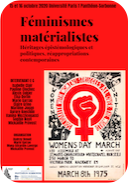Symposium descriptionWhat is called “social reproduction theory” has been emerging in France for a few years now. After the success of the manifesto Feminism for the 99% published in 2019, evidences for its growing attractiveness include the translation in 2020 of the collective work edited by Tithi Bhattacharya Social Reproduction Theory: Remapping Class, Recentering Oppression; the issue “Sur la reproduction sociale” by the journal Actuel Marx in 2021, and in 2022 the translation of Lise Vogel’s classic Marxism and Women’s Oppression: Towards a Unitary Theory. To these recent editorial events should be added several articles appearing regularly in the online journals Contretemps and (former) Période, the prompt translation of Silvia Federici’s work since Caliban and the witch in 2014, and finally several symposiums dedicated to materialist feminisms (including “Féminismes matérialistes. Epistemological and political legacies, contemporary reappropriations”, in Paris in 2020; and “Care(s) matérialiste(s)Care(s) matérialiste(s)” in 2022).
However, the reception of feminist theorizations of social reproduction in the French academic context remains relatively slow if we compare it to its diffusion in other countries. Two reasons seem to explain this: on the one hand, the primacy, in feminist political economy, of the materialist perspective developed by Christine Delphy and more broadly by the French materialist school, which for a long time marginalized the alternative approach developed by Italian autonomists; on the other hand, the spontaneous association of the concept of reproduction with the sociology of Pierre Bourdieu and, to a lesser extent, the philosophy of Louis Althusser. In this context, an important work of presentation and articulation of the theoretical aspects of social reproduction remains to be done. Starting from this observation, the symposium is structured around two axes of investigation: a historical or diachronic axis, and a contemporary and synchronic axis. First, we wish to return to the classical feminist approaches to social reproduction and put them in dialogue with the alternative proposals that have nourished them, that they have discussed and displaced, or that have developed in parallel in the field of Critical theory. Marx, Althusser, Bourdieu and the Frankfurt School are in this respect inevitable interlocutors and perhaps theoretical partners. As for the second line of inquiry, it intends to map the contemporary landscape of theories of social reproduction and to confront them with other critical interventions on the crucial concepts of work, nature, exploitation and domination, for example. It thus calls for both an internal discussion of this paradigm whose rebirth was precipitated by the financial crisis of 2007-2008, and its external confrontation with ecofeminism, ecological Marxism, the ethics and politics of care, the thesis of the centrality of work, the concept of intersectionality, and the theory of the commons. The symposium will open with a lecture by Nancy Fraser, who has played and continues to play a major role in the rediscovery of the theory of social reproduction and in exposing its importance for the social and political philosophy of our time.
|




